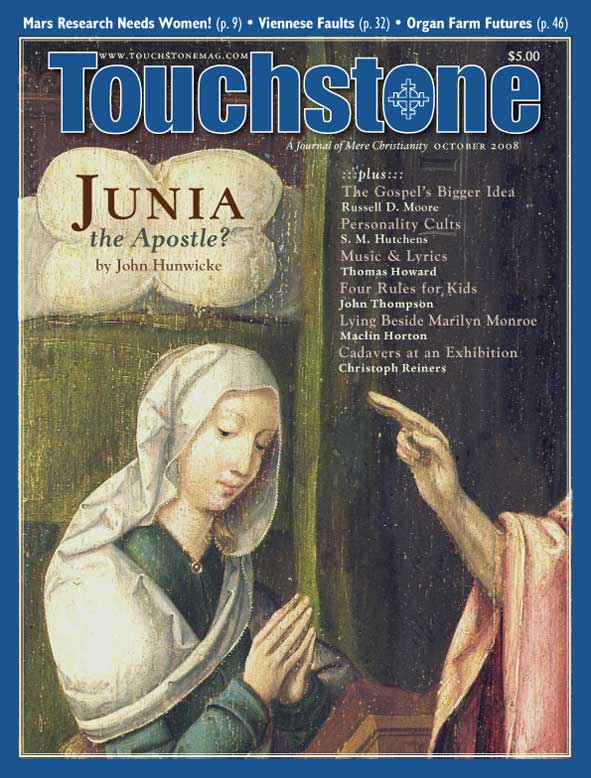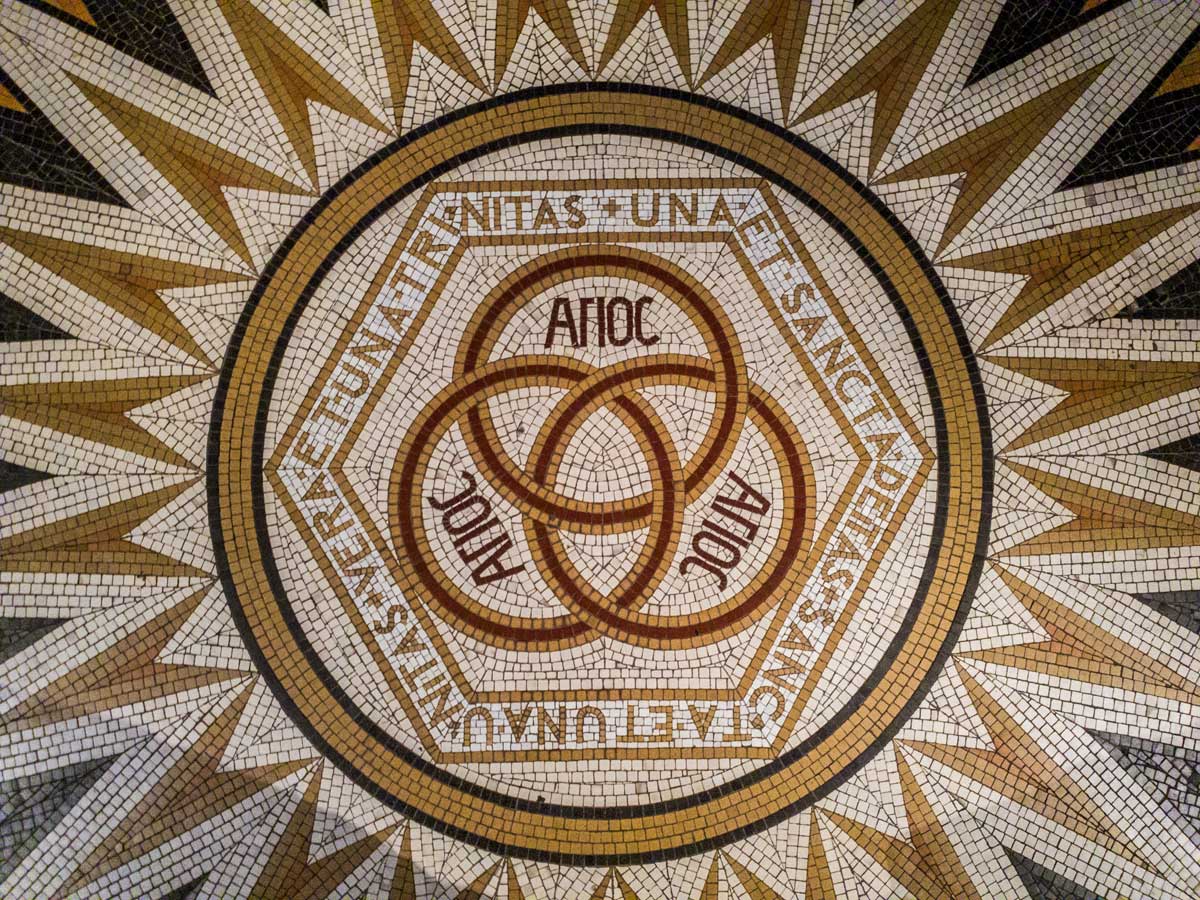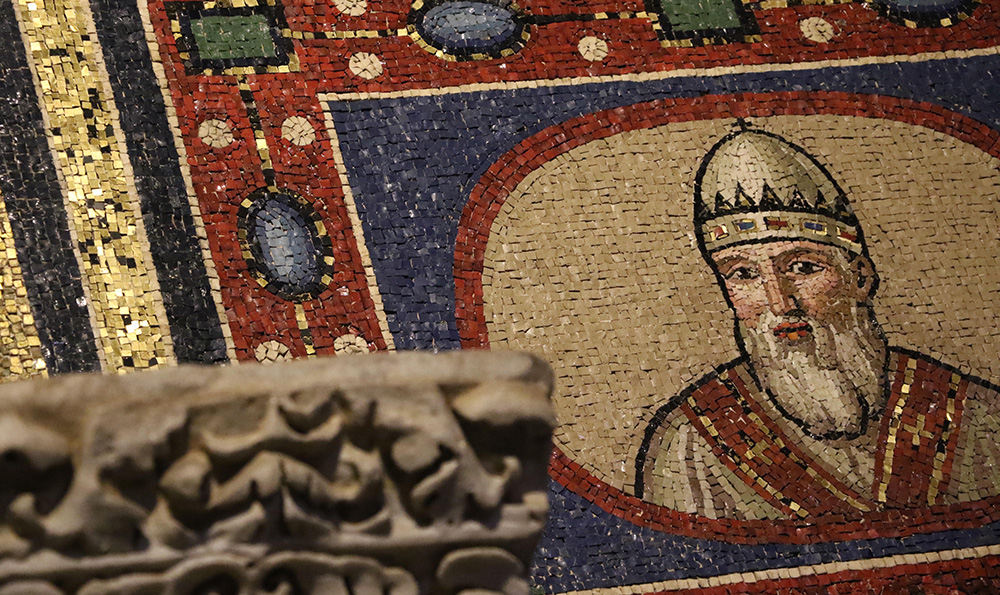The Gospel’s Bigger Idea
You Can’t Tell the Story of Jesus Without Jesus
by Russell D. Moore
Have you ever seen the episode of Veggie Tales in which the main characters are martyred by anti-Christian terrorists? You know, the one in which Bell Z. Bulb, the giant garlic demon, and Nero Caesar Salad, the tyrannical vegetable dictator, take on the heroes for their faith in Christ? Remember how it ends? Remember the cold, dead eyes of Larry the cucumber behind glass, pickled for the sake of the gospel? And Bob the tomato, of whom all that remained was ketchup and seeds?
Of course you don’t. It doesn’t exist—and it never will. The creative minds behind the popular children’s program would reject it out of hand, and the Evangelical video-buying public wouldn’t hand over the cash to buy it. It would be considered too disturbing, too dark, for children.
Bloodless & Mainstream
Instead, the Veggie Tales episodes are bloodless. They take biblical stories, and biblical characters, but they mine the stories for abstractions, for timeless moral truths that can help children be kinder, gentler, and more honest. There’s almost nothing in any episode that isn’t true. But Jesus is missing.
Hillary Warren argues in her study There’s Never Been a Show Like Veggie Tales: Sacred Messages in a Sacred Market that Jesus couldn’t be portrayed as a vegetable without causing many Christians to charge Big Idea—the company that produces the Veggies—with trivializing the Incarnation. A lion is one thing, but a pop-eyed eggplant is something entirely different.
But also, she notes, “from an economic standpoint, the absence of Jesus meant that the series was open to a broader audience than the evangelical Christian one.” Offering “limited references to God” while making sure “the connection to God is not made through Jesus” enables the series to be “the Amy Grant of Christian Video,” able to cross over to a mainstream audience.
In his autobiography Me, Myself, and Bob: A True Story about Dreams, God, and Talking Vegetables, Veggie Tales creator Phil Vischer writes about his mother, a children’s ministry consultant with an Evangelical publisher, telling him from the beginning that Jesus should never be portrayed as a talking vegetable. He agreed, “not quite grasping that this guideline would eliminate much of the New Testament as source material for Veggie Tales.”
She likewise warned him not to “imply that vegetables can have redemptive relationships with God.” He should not “show vegetables praying unless they’re playing the role of a historical or biblical figure.”
He talks about the pressure from his growing company’s executive team to expand the Veggies’ appeal beyond Christian customers to “moral active families” by reducing the specifically Christian content. Early on, one potential distributor asked him to remove the Bible verses and references to God from the series.
He admits he was tempted to do it because these videos would be available to many more customers, customers who after “falling in love” with the vegetables would “surely bump into our shows that still had God in them.” But he couldn’t do it. As he put it: “I thought about our second video, in which we taught kids that we should forgive others because God is always ready to forgive us.”
I tried to imagine that lesson without God in it—“Forgive others, because . . . it will ‘grease the wheels of society’?” If God wasn’t in it, our characters were just flapping their jaws. It was all nonsense. God was the “why” behind everything I wanted to communicate. Take him out, and I might as well go home, sit on the couch, and watch MTV.
But Jesus was already missing, in exactly the way his potential business partners wanted. They didn’t mind an implicit God, the unspoken-of Being behind all that love and forgiveness and morality. Vischer is correct that one cannot teach Christian children to forgive without reference to God. But why does one want them to forgive? Can one teach Christian children to forgive without reference to the Cross?
Veggie Tales Preaching
The problem with Veggie Tales isn’t the series. It is an excellently imagined and executed vision from American Evangelicals who are not doing anything particularly unusual when it comes to the contemporary American Christian use of the biblical narrative. The problem is the theology.
Whenever we approach the Bible without focusing in on what the Bible is about—Christ Jesus and his gospel—we are going to wind up with a kind of golden-rule Christianity that doesn’t last a generation, indeed, that rarely lasts an hour after it is delivered. And there’s plenty of Veggie Tales preaching out there, and it’s not all for children, because the way we teach children the Bible grows from what we believe the Bible is about: what’s really important in the Christian life.
Preaching Christ doesn’t simply mean giving a gospel invitation at the end of a sermon, although it certainly does entail that. It means seeing all of reality as being summed up in Christ, and showing believers how to find themselves in the story of Jesus, a story that is Alpha and Omega, from the spoken Word that calls the universe together to the Last Man who governs the universe as its heir and King.
I have never seen the film The Sixth Sense, not only because my movie picks don’t typically extend to horror pictures, but also because it’s been ruined for me. Long ago, a friend explained to me the premise of the film. If I saw the movie now, I would see the same film everyone else saw at its release, but I would be seeing it with the mystery decoded. I would see where the story was going.
The same is true of the storyline of Scripture. The apostles announce that a great mystery has been revealed in the gospel of Christ Jesus, a mystery that explains the “whys” of everything from the creation itself to the existence of the nation of Israel to the one-flesh union of marriage.
Paul tells us that what God has been doing in his universe for all these millennia has a purpose, “which he set forth in Christ as a plan for the fullness of time, to unite all things in him, things in heaven and things on earth” (Eph. 1:10). He declares of Jesus that “all things were created through him and for him” and that “in him all things hold together” (Col. 1:16–17).
Jesus’ Reality
Thus, every text of Scripture is about Jesus, because everything in reality is about Jesus. Why is there something instead of nothing? Why are human beings religious? Why do people want food and water and sex and community? Why are there galaxies and quasars and blue whales and local churches?
The answer is: Jesus. God is creating all that is for his heir, for the glory of Jesus Christ. When you see reality through Jesus, reality makes sense.
With this in mind, the gospel writers show us how Jesus fulfills the Scripture. But he does not simply fulfill the obvious messianic prophecies, he relives the story of Israel itself: exiled in Egypt, crossing the Jordan, being tempted with food and power in the wilderness during a forty-day sojourn there. Jesus applies to himself language previously applied to Israel and its story. He is the vine of God, the temple, the tabernacle, the Spirit-anointed kingship, the wisdom of God himself.
What David cries out about his own lament is fulfilled, the prophets tell us, in the crucifixion of Jesus—from the thirst he experiences, to the betrayal by a friend, to the casting of lots for his garments, to the counting of all of his bones (Psalm 22)—and the final vindication David seeks is found in Jesus’ empty tomb (Acts 2). What the prophets testify will happen to righteous Israel—that the remnant will be raised from the dead, anointed with the Spirit, granted the promised land (Ezek. 37:12–14)—is fulfilled in the death, burial, and resurrection of Jesus.
When the Apostles Peter and Paul and the Deacon Stephen recount the story of Israel in the Book of Acts, they show how the story of Israel culminates in the life, death, burial, and resurrection of Jesus (Acts 2; Acts 4; Acts 7; Acts 13). When the Apostle John sees the panorama of Israel’s story in his Patmos vision, he sees one story, the story of a man-child and a dragon who seeks to destroy him (Rev. 12). This is why behind all of the enemies of God—from Cain to Pharaoh to Nebuchadnezzar to Herod to Caesar—there stands a snake.
The entire storyline of the Scripture—from Abraham to Rahab to David to Mary—coheres in God’s purpose in Christ (Matt. 1). God chooses and protects and fights for Israel, not because the Israelites were worthy of his defense, but simply because, “from their race, according to the flesh, is the Christ, who is God over all, blessed forever” (Rom. 9:5).
That’s Our Story
No human being can live without stories, particularly without a central narrative explaining his existence and his place in the world. We are all longing for a past, and a future, and a storyline that makes sense of it all. Most of the stories we tell ourselves are self-justifying and false, because to explain and justify our rebellion against God we make up narratives that are inevitably perversions of the story of Christ.
Some take up the story of the dawning of a classless society or a thousand-year Reich or the “end of history” in capitalist democracy. Some choose the story of a feminist triumph over the patriarchy. Some take for their own the story of human progress from the evolutionary struggle of nature.
That is our choice. We will either find ourselves, as Paul puts it, “hidden in Christ”—so that his ancestors are our ancestors, his life is our life, his sacrificial crucifixion is our crucifixion, his resurrection is our resurrection—or we will stand before God with our own identity, our own history, our own (fictional) story.
This is why the Apostle Paul was able to make the audacious claim that he “decided to know nothing among you except Jesus Christ and him crucified” (1 Cor. 2:2). Is this really true? Did he not speak of many things—the coming resurrection, sexual morality, divisions in the church, congregational discipline, baptism, spiritual gifts, fruit of the Spirit?
Yes. But he knew none of these things apart from the mediation of a crucified Christ. These things were all part of a big picture of what God is doing with the world through Jesus Christ.
Why is this so important? Why can’t I simply take the good things from the Scripture without showing how everything fits together in Christ? Because, apart from Christ, there are no good things. Paul knew what Abraham and Isaac and Moses and David saw dimly before them, that in Jesus “all the promises of God find their Yes in him” (2 Cor. 1:20).
Look at the false stories recorded in the Gospels. In the temptations, Satan quotes Scripture to Jesus, and does not misquote the promises. God wants children to eat bread, not to starve. God will protect his anointed One with the angels of heaven. God will give his Messiah all the kingdoms of the earth.
All this is true. What is satanic about it is that Satan wanted our Lord to grasp these things apart from the cross and the empty tomb. These promises could not be abstracted from the gospel.
When Lazarus dies, his sister Martha rebukes Jesus for not being there. When Jesus mentions the resurrection, she speaks of the resurrection as though it were a generic category, abstracted from Jesus himself, a story without the main character. Jesus’ response to her sums up God’s plan. “I am the resurrection, and the life” (John 11:21–25).
The rich young ruler who visits Jesus is seeking the right thing, isn’t he (Luke 18:18–23)? He wants eternal life. He wants the inheritance. What he doesn’t want is Jesus. He wants his own self-justifying story, of a perfectly kept law. He clings to his lie, instead of finding himself in the Truth.
To Hell with the Bible
The people in our pews can go to hell clinging to Bible verses abstracted from Jesus. One can easily misread the message of Psalm 24: “Who shall ascend to the hill of the Lord? And who shall stand in his holy place? He who has clean hands and a pure heart, who does not lift up his soul to what is false and does not swear deceitfully” (Psalm 24:3–4).
Perhaps the Pharisee that Jesus mentions had this verse in mind when he stood in the Temple, next to the repentant publican. Perhaps the Pharisee—and his successor in our churches today—can say, “Thank you, God, that I can approach you with clean hands and a pure heart.” That attitude is damning.
It is damning not because the passage is not true—it is. It is damning because only one Man can stand before the holiness of God, the only Man with a pure heart and clean hands, only One who is the righteousness of God. If I pretend to come before God apart from him—as though this text and a thousand more like it apply to me outside of Jesus Christ—I will only find condemnation.
But, hidden in Christ, this promise is my promise. When I cry out with the publican, “Have mercy!” and find myself in Christ, then everything that God has promised to Jesus now belongs to me.
The prosperity gospel teacher on the airwaves attempts to bypass Jesus, pointing to promises of length of days and wealth beyond measure for those who are blessed of God. The grinning televangelist tells the cancer-stricken mother that if she is blessed by God, she’ll be healed. He tells the laid-off factory worker that if he is blessed by God, he will prosper. He cites verses from Deuteronomy, verses that are the inerrant Word of God, but verses that point to an inheritance that belong to the Blessed One, to Jesus of Nazareth, the One who receives the inheritance.
If I am in Christ, then a health-and-wealth prosperity gospel is indeed what I receive, but more health and more prosperity than Joyce Meyer or Kenneth Copeland can ever conjure up. In Christ, I am raised from the dead and will one day be resurrected in fact with him. In Christ, I have the ends of the earth as my inheritance, with him at the right hand of the Father. At his coming, those promises will be received by sight as well as by faith.
Our Story, Too
It is only when I see what God is doing with the world through Christ, and for the glory of Christ, that I am able to see where I fit in the big storyline of the universe or in the little storyline of my own life.
The Apostle Paul’s words to the Romans are familiar passages of comfort for believers. “And we know that for those who love God all things work together for good, for those who are called according to his purpose” (Rom. 8:28). Paul is not offering a cheery “What doesn’t kill you will make you stronger; hang in there,” nor is he saying that God will arrange the events of your future so that you get what you want.
He says that the believer’s little story ultimately is a glorious one because it is part of a larger story, that I may be “conformed to the image of his Son, that he may be the firstborn among many brothers” (Rom. 8:29). How do I know that my story ends happily? I only know this if I am found in Christ.
If I am, then, like all my believing forefathers and foremothers before me, I am free from condemnation, liberated from the curse, triumphant over death, the heir of the universe, the child of God in whom he is well pleased.
How do I know this? I know it because I know the story of Jesus. I know that David may be dead and buried—but Jesus was raised. I know that Moses may never have walked in the Land of Promise—but Jesus has received it. I know that Abraham never saw with his eyes his descendants outnumber the stars—but Jesus stands before his Father, “Behold, I and the children God has given me” (Heb. 2:13).
I know that when the Accuser indicts me of sin, so that I am worthy of sharing a lake of fire with him and his minions, I can point to Jesus Christ and announce, “I have already been to hell—and in Christ, there is therefore now no condemnation.”
We have more than a Veggie Tales gospel. We have a gospel about bones and blood and mangled flesh. We have a gospel of nail-scarred hands and a table of bread and wine. We have a gospel that propels us to suffer and even to die, because we have seen how God has kept his promise to the pioneer of our salvation, our firstborn Brother, our Lord Jesus.
Instead Proclaim Christ
As we teach and preach and disciple and evangelize, let’s not simply teach our people how to be moral, or how to be well-tempered, or how to be authentic, or (in the productions that might be called Veggie Tales for Adults) how to put the erotic energy back into their marriages and take control of their finances. Let’s teach them how to find themselves in Christ, to conform to his life, and through his Spirit to follow his steps, looking always to his cross and his resurrection and his glory.
Let’s put aside any teaching—whether in our children’s programs or in our Sunday morning sermons—that offers “limited references to God” while making sure “the connection to God is not made through Jesus,” and instead proclaim Christ. Let’s reclaim the narrative of Scripture and let’s remember that it is not a set of doctrines or a compilation of ethical principles or a guidebook of psychological tips, but the story of a Person who was dead and is now alive. Let’s anchor our lives in that Story, and sing in the words of an Evangelical gospel song, “I love to tell the Story, because I know it’s true.”
If we tell the story well enough, we won’t need talking cucumbers and tomatoes to get the attention of our children, or sex and financial tips to get the attention of their parents.
Russell D. Moore is president of the Ethics and Religious Liberty Commission of the Southern Baptist Convention. He is a senior editor of Touchstone.
subscription options
Order
Print/Online Subscription

Get six issues (one year) of Touchstone PLUS full online access including pdf downloads for only $39.95. That's only $3.34 per month!
Order
Online Only
Subscription

Get a one-year full-access subscription to the Touchstone online archives for only $19.95. That's only $1.66 per month!
bulk subscriptions
Order Touchstone subscriptions in bulk and save $10 per sub! Each subscription includes 6 issues of Touchstone plus full online access to touchstonemag.com—including archives, videos, and pdf downloads of recent issues for only $29.95 each! Great for churches or study groups.
Transactions will be processed on a secure server.
more from the online archives
calling all readers
Please Donate
"There are magazines worth reading but few worth saving . . . Touchstone is just such a magazine."
—Alice von Hildebrand
"Here we do not concede one square millimeter of territory to falsehood, folly, contemporary sentimentality, or fashion. We speak the truth, and let God be our judge. . . . Touchstone is the one committedly Christian conservative journal."
—Anthony Esolen, Touchstone senior editor









